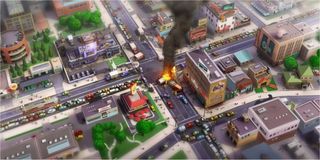SimCity Sells 2 Million Copies, EA Is Happy Despite Major Player Drop-Off

SimCity... 2013's Diablo III. This year's abomination to the SimCity legacy proved that gamers aren't ready or willing to embrace an always-on gaming atmosphere for non-MMO games. However, despite the outcry and the major player drop-off rates for the game, SimCity was still a success for Electronic Arts.
According to EA's labels president, Frank Gibeau, he told Gamesbeat [via Gamespot] that...
“...we've sold more than 2 million units, and the number of people logging in and playing is holding steady. SimCity is a success," ... "However, underestimating demand in the first month was a major miss. We hope that the game and the service we’ve provided since then meets the fans' high standards."
Oh fail... that's not good.
The thing is, you don't want companies seeing non-MMO games with an always-on DRM infrastructure as a means of “potential success”. It means that they'll keep trying their magic formula to find a way to seep it into your regular purchasing habits – whether it be the latest BioWare title or a game from DICE – and then keep you hooked until they're ready for you to lay down another $60 on their latest shiny object.
Ultimately, always-on DRM is a way to control who plays your game and for how long. It's a perfect measure to also segue your playerbase into a new game by announcing that the servers are shutting down, a common thing for a company like EA to do for games that are two or more years old.
Thankfully we haven't had any major brands or franchises (other than Diablo III and SimCity) adopt the always-on DRM mechanism, but the fact that companies are getting more bold with it – and in this case, showboating about the success of it – it spells scary times ahead.
On the upside, SimCity didn't quite maintain as healthy a userbase as Gibeau lets on. Many gamers, after the initial fallout, parted ways rather quickly and just a month after launch the game had moved into the number 20 spot on the most games played in April. If that doesn't seem that bad, take into consideration that by May SimCity had moved into the 65th position for the most played game of the month and the playtime had dropped by 72% from the previous month.
CINEMABLEND NEWSLETTER
Your Daily Blend of Entertainment News
Simply put, gamers may have bought SimCity but they certainly weren't staying as permanent residence.
Despite Gibeau downplaying how awful the launch was for SimCity with the always-on DRM preventing a lot of people from logging in, much less being able to actually play, he does admit that the horrendous community backlash did play a big role in ensuring that the Sims 4 would not be always-on, saying...
In the last few months, we have started making changes to the business practices that gamers clearly don't like," ... "In the spring, we dropped our online pass program for consoles--both next-generation and current-generation. We listened to the feedback on SimCity and decided that The Sims 4 would be built as a single-player, offline experience."
Well, that's great news. We can rest easy right... it's not like EA has an alternative scheme up their sleeves to financially gouge gamers... right?
Staff Writer at CinemaBlend.

I Rewatched Game Of Thrones' Pilot 13 Years After Its Premiere, And I Need To Rethink My Favorite Characters

10 Shows Like The Rookie And How To Watch Them

Curb Your Enthusiasm’s Showrunner Told Us How Jerry Seinfeld’s Hilarious ‘Sex Tape’ Riff With Leon Happened, And What Made Him Laugh The Most In The Series Finale
Most Popular







